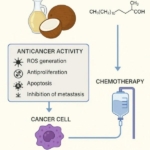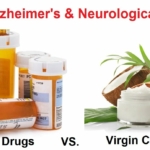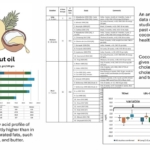by Paul Fassa
Health Impact News
There have been several studies from countries outside the U.S. that show the health virtues of coconut oil for Alzheimer’s Disease. Meanwhile, pronouncements from the USA’s Alzheimer’s Association and medical press releases, warning against using coconut oil, have persisted.
These international studies’ conclusions fly in the face of our “expert” opinions that, as a saturated fat, coconut oil threatens heart health. This misinformation continues even as medical practitioners of all types are realizing that the lipid theory of heart disease as the leading contributor to poor heart health is simply not true.
Actually, arterial inflammation is caused by excessive sugar and concentrated fructose isolates, such as HFCS (high fructose corn syrup), which are the main dietary culprits of arterial and heart disease.
Other Nations’ Studies Support Coconut Oil’s Ability to Reduce Alzheimer’s Disease Symptoms
The most recent study was published on July 20th, by the Journal of Alzheimer’s Disease. This human study was conducted by academic researchers in Valencia, Spain, and titled Improvement of Main Cognitive Functions in Patients with Alzheimer’s Disease after Treatment with Coconut Oil Enriched Mediterranean Diet: A Pilot Study.
The study’s purpose was to explore the possibility of using coconut oil as an alternative treatment for Alzheimer’s disease (AD). The researchers were fully aware of coconut oil’s metabolism into ketones and the brain’s ability to use ketones more efficiently than glucose.
They combined 44 AD patients into two groups of 22. One group was put on a Mediterranean Diet enriched with coconut oil, and the other group of patients did not have any coconut oil in their diet at all.
After 21 days of observation and testing, the researchers noted “improvements in episodic, temporal [time] orientation, and semantic memory were observed,” leading them to conclude:
The isocaloric coconut oil enriched Mediterranean diet seems to improve cognitive functions in patients with AD, with differences according to patient sex and degree of severity of the disease, although more studies in this line are needed.
This was a remarkable result, as there were measurable improvements among AD patients in 21 days from adding coconut oil to a Mediterranean diet, which has dietary elements already generic among the study subjects. (Study abstract)
There have been two other animals studies published this year (2018) supportive of coconut oil for Alzheimer’s disease, illustrating the positive effects of coconut oil as a possible dietary alternative solution for Alzheimer’s disease’s debilitating symptoms. And they were both conducted outside of the U.S.
See: More Research Published Supporting Coconut Oil’s Claim to Heal Alzheimer’s Disease
Coconut Oil for Dementia Has Been a Grass Roots Movement
So far, the pharmaceutical industry has not come up with anything effective and safe for Alzheimer’s patients, despite the industry’s expensive attempts.
This justifies the pharmaceutical-owned, mainstream medical profession to declare there is no cure for the progressive disease of Alzheimer’s. So far, they’ve failed to create anything that is promising for treating Alzheimer’s. (Source)
The grassroots movement of using dietary coconut oil for preventing and reversing dementia was started by Dr. Mary Newport in 2007. Her failed efforts to handle her husband’s increasingly downward spiral of Alzheimer’s with available drugs motivated her to experiment with coconut oil. Her husband’s rapid turn-around led Dr. Newport to publish a case study, Alzheimer’s Disease: What If There Was a Cure?
The popularity of her case study and ensuing book led to media interviews. Even Dr. Oz presented information on coconut oil’s positive effects on brain health on his TV show. People experiencing early signs of dementia began their own coconut oil experiments, while caregivers of Alzheimer’s victims made sure coconut oil was consumed by those for whom they were caring.
Ketones created from the medium chain triglycerides (MCT) are easily metabolized by the liver from the saturated fat of coconut oil. The ketones actually provide fuel for a brain which is metabolically hampered from creating energy with glucose. This is evidence that a saturated fat turns out to provide the brain with needed energy. (Source)
The “baby-boomer” senior citizen market for drugs is growing, and many of those who are unnecessarily prescribed statin drugs will expand the market demand to treat dementia after their brains have been starved from their much-needed cholesterol.
Perhaps just as important as ketones are for brain fuel is the brain’s structural need for cholesterol. The brain contains around two percent of the body’s mass, yet it needs 24 percent of the body’s cholesterol in its structure and nerve synapse connections. Additional cholesterol is needed for the myelin sheaths that insulate nerves throughout the central nervous system.
See: The Low-fat Diet and Cholesterol Lowering Drugs Part of the Problem?
The positive, anecdotal testimonials from coconut oil for dementia were all over the internet from folks knowing coconut oil was safe and worth trying even if “science” had not approved it for Alzheimer’s yet. A few of them are here and more are here.
USA Studies of Coconut Oil for Alzheimer’s Not Allowed
When Dr. Mary Newport wanted to give her husband’s case study testimony at an annual Alzheimer’s Association conference in 2007, her request was denied. Furthermore, the conference committee had security follow her around and monitored while she simply attended the conference as a spectator.
It was obvious that her clinical testimony was not welcome despite her credentials and success. And this non-profit that claims to serve the interests of Alzheimer’s victims wanted to make sure Dr. Newport wouldn’t be soliciting her findings to other attendees. (Source)
It could be said that the Alzheimer’s Association (AA) is a front group protecting the pharmaceutical industry. And Big Pharma cannot make money off coconut oil, because it can’t be patented. This non-profit (AA) brings in around a quarter of a billion dollars a year from donations, government grants, and other sources. (Source)
Around one-fourth of that revenue goes to administrative costs and salaries. The other three-fourths is supposed to be for research. Why would the few million needed for coconut oil studies on Alzheimer’s be a big deal for such an endowed group claiming to be concerned about seniors’ mental health?
It would take less funding for testing coconut oil on people with Alzheimer’s disease to qualify coconut oil’s efficacy in humans, because coconut oil is not toxic. Preliminary testing would not be required for determining toxicity, despite the Alzheimer’s Association strongly suggesting it could be dangerous.
See: Alzheimer’s Association Warns Against Coconut Oil – Member Replies “Coconut Oil Gave us our Father Back!”
The USA Coconut Oil Human Study that Wasn’t
Apparently, there’s a network of doctors and pharmaceutical industry members who influence where National Institutes of Health (NIH) research funding goes. Conflicts of interest lead to corruption. Former NIH statistician, Dr. Kenneth Jones, filed a lawsuit against Harvard Medical School for issuing false study data to acquire more funding for Alzheimer’s research.
Dr. Jones had become a whistleblower after his demands for independent proof of the Harvard study’s merits for a 15-million-dollar grant. He was fired for questioning their demand. So he resorted to filing a lawsuit against the Harvard Teaching College and certain key principals. In 2012, the courts ruled it could proceed to trial. (Source)
Never mind the issues with NIH and Alzheimer’s Association. A private foundation funded a study at the University of South Florida (USF). It was looking good until Amanda Smith, Medical Director of USF’s Health Byrd Alzheimer’s Institute in Tampa, Florida, near the hospital where Dr. Mary Newport worked, told CTV News in Canada:
The pharmaceutical industry is in this, of course, to make money for their companies, and of course they want to help people theoretically, but at the end of the day it is about dollars and cents, and so money gets invested in things that are new or patentable rather than things that are sitting on the shelf already. There is no one who really stands to benefit from this except the patients. For us that is enough, that is our mission, that is who we want to help. (Source)
But little to nothing was publicized about this after the initial announcement in 2013. What happened? A search came up with the U.S. Department of Health and Human Services National Institute on Aging page declaring the study had been terminated. There was no explanation why.
The government and large foundations thrive with Big Pharma’s demands for more funding. The system is corrupt, unreliable, and dangerous. This is where you can keep up with coconut oil’s efficacy for many ailments, including dementia and other neurological disorders: Coconutoil.com.




 Research Continues to Show Virgin Coconut Oil's Effectiveness in Treating Cancer
Research Continues to Show Virgin Coconut Oil's Effectiveness in Treating Cancer Coconut Oil Continues to Benefit Alzheimer's Patients over Drugs as Studies Continue for Neurological Benefits
Coconut Oil Continues to Benefit Alzheimer's Patients over Drugs as Studies Continue for Neurological Benefits How the Simple High-Fat Low-Carb Ketogenic Diet Continues to Change People's Lives
How the Simple High-Fat Low-Carb Ketogenic Diet Continues to Change People's Lives New Studies Continue to Show that Coconut Oil is the Best Oil for Treating Skin Conditions and Maintaining Healthy Skin and Teeth
New Studies Continue to Show that Coconut Oil is the Best Oil for Treating Skin Conditions and Maintaining Healthy Skin and Teeth New Study Confirms Health Benefits of Coconut Oil and USDA False Claims Against It
New Study Confirms Health Benefits of Coconut Oil and USDA False Claims Against It
Leave a Reply